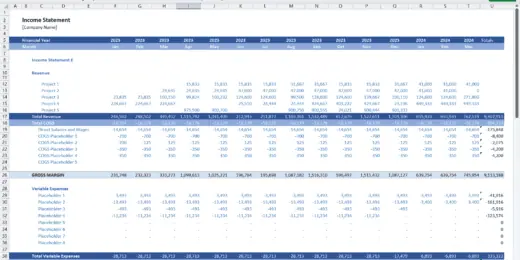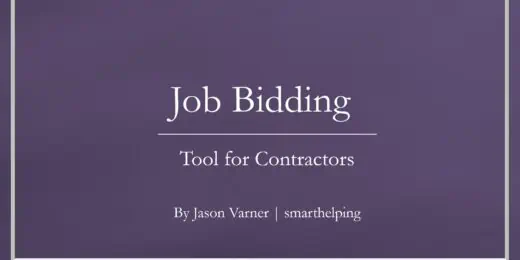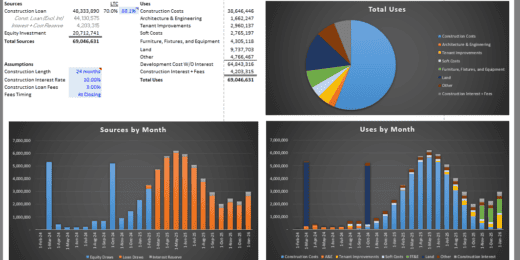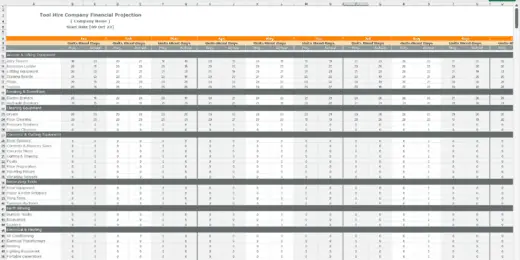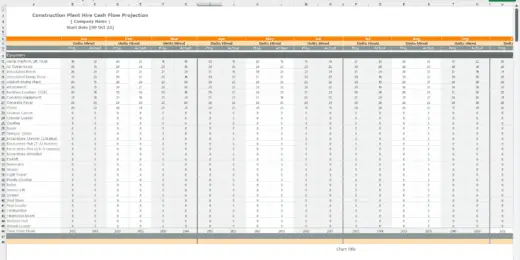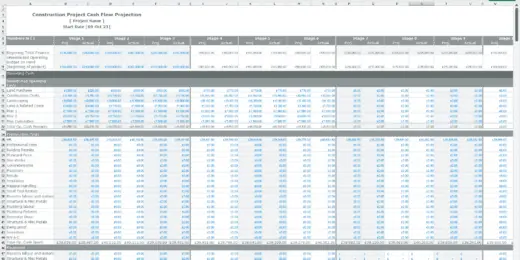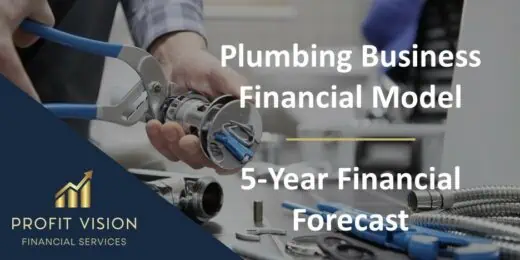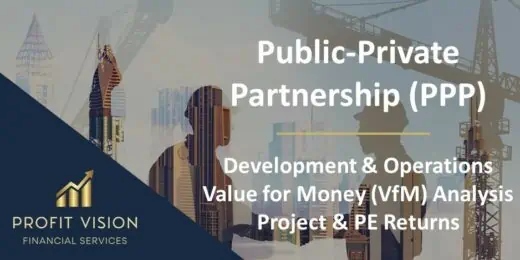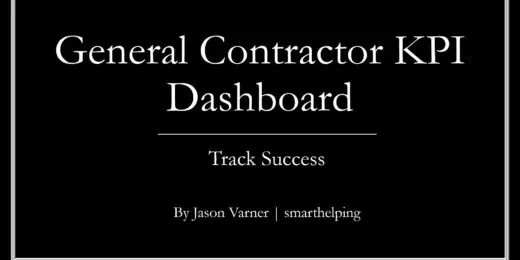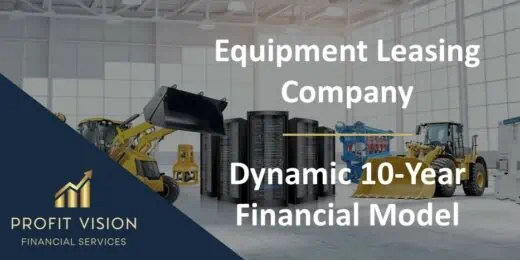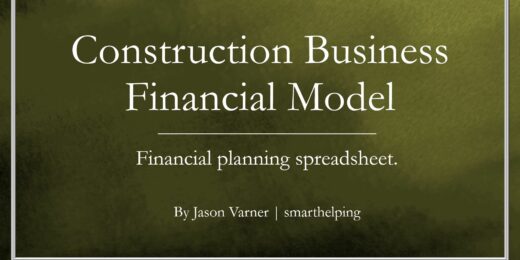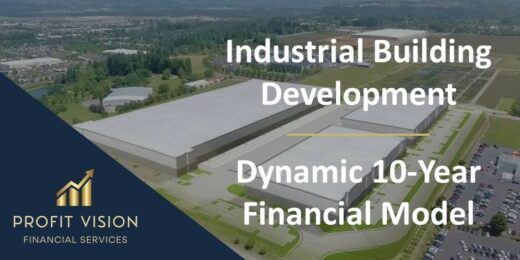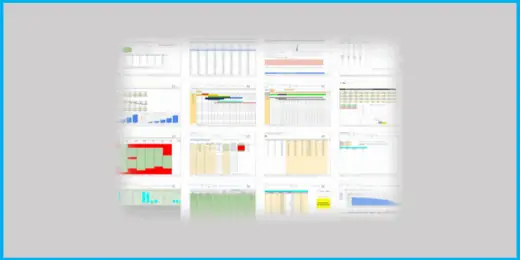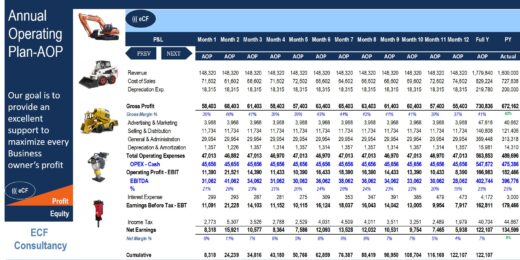Construction
Our construction company business plan templates are not just spreadsheets but a roadmap to success. Crafted with industry-specific nuances, they help you lay out your business strategy with clarity and foresight. Navigate the complexities of financial planning in construction with our robust cash flow projection models. Understand your liquidity position and manage your resources more effectively. Whether you're pitching to investors or valuing your business, our construction company business plan templates provide the necessary financial rigor and detail to support your objectives.
Project Finance Excel Model – 10 Year Projection
The template creates a financial model for your individual project…
Architecture Firm Management Dashboard Excel Template (6 Month)
Our Excel dashboard and template streamline small and medium architecture…
5 Year 3 Statement Construction Company Finance Model
A comprehensive editable, MS Excel spreadsheet for tracking construction company…
5 Year 3 Statement Architect Company Finance Model Excel Template
A comprehensive 5 Year 3 Statement editable, MS Excel spreadsheet…
Construction Machinery Rental Company Financial Model
Discover the key to financial planning in the construction machinery…
Construction Draw Schedule & Gantt (New Development Cost/Sources & Uses Model)
Elevate your construction project planning with our Construction Draw Schedule…
Construction Tender and Proposal Example and Model Answer
A successful, high-quality and detailed tender and proposal document that…
Crane Truck Rental Company Financial Model
Step into the world of crane rental business success with…
Renovation Project Finance Model
A comprehensive editable, MS Excel spreadsheet for tracking renovation project…
Tool Hire Company Finance Model
A very comprehensive editable Excel spreadsheet for tracking your tool…
Plant Hire Business Financial Model
A comprehensive editable MS Excel spreadsheet for tracking your plant…
Construction Project Finance Model
A comprehensive editable, MS Excel spreadsheet for tracking project financials…
Financial Feasibility Study – Excavation Contractor
The report is containing full set of financial feasibility study…
Business Plan – Stone Fabrication & Installation
The Business Plan is for Stone Fabrication & Installation industry,…
Plumbing Business Financial Model – 5 Year Forecast
Financial Model providing an advanced 5-year financial plan for a…
House Flipping – Rehab Financial Model
The house flipping financial model is a comprehensive tool designed…
EPC Model for Builders and JV Partners
The EPC Financial Model Template for Builders and JV Partners…
Public-Private Partnership (PPP) Financial Model
Financial Model presenting development and operating scenarios of various projects…
Equipment Rental Business Financial Model – w/ Excel/Google Sheets version
The equipment rental financial model is a comprehensive tool designed…
Bundle – Business Financial Forecasting Models
The purpose of this Bundle of Business Forecasting and Financial…
Carpentry Business – 5 Year Financial Model
Financial Model providing an advanced 5-year financial plan for a…
Electrician Business Financial Model – 5 Year Forecast
Financial Model providing an advanced 5-year financial plan for an…
KPI Dashboard: Quote vs Actual Gross Profit Margins
This dashboard will improve the tracking of any general contracting…
Artisan Contractor Business – 5 Year Financial Model
Financial Model providing an advanced 5-year financial plan for an…
Energy Project Finance (Infrastructure Model)
This is a special project vehicle (SPV) for an Energy…
Project Finance Model for a Highway SPV Project
This Project Finance Model for a Highway SPV Project is…
Equipment Leasing Company Financial Model – Dynamic 10 Year Forecast
Financial model providing a dynamic 10-Year Financial Plan for an…
Construction Contractor Business – Cash Flow Forecast
This financial model lets the user plan out cash requirements…
Park & Resort Construction Project Integrated Financial Model
This model is to provide users an integrated and fully…
Quantity Surveyor / Architect – Project Financial Feasibility Model
This Project Feasibility Model is purpose-built to assist Quantity Surveyors,…
Property Preservation Financial Model Excel Template
Property Preservation Pro Forma Template There's power in Cash Flow…
Remodeling Service Financial Model Excel Template
Remodeling Service Financial Model Solid package of print-ready reports: P&L…
Roofing Service Financial Model Excel Template
Roofing Service Financial Model Impress bankers and investors with a…
Toll Road Financial Model (Development, Operation & Valuation)
Financial Model providing forecast and profitability analysis for a development…
Electrical Contractor Financial Model Excel Template
Electrical Contractor Financial Model Enhance your pitches and impress potential…
Construction Management Financial Model Excel Template
Construction Management Financial Model There's power in Cash Flow Projections…
Construction Company Financial Model Excel Template
Construction Company Financial Model Create fully-integrated financial projection for 5…
Industrial Building Development Financial Model (Construction, Operation, & Valuation)
Financial model presenting a development scenario for an Industrial Building…
End User Real Estate Development Model – Development Feasibility & Budgeting Model
This model can be used to budget and analyze the…
Startup Business Plan – Plumbing Company
The report is containing full set of financial feasibility study…
Discounted Cash Flow (DCF) Valuation Excel Model (Engineering and Construction)
Detailed Financial model for DCF valuation on Engineering and Construction…
Training Tracker – Human Resources Tool: Up to 499 Employees
A great tool for any HR manager that needs to…
Business Plan – Construction & Mining Machinery Dealers
If you dream to start or develop a construction &…
Single Family Development Model Pro-Forma Template
This is a fully functional, institutional quality, and dynamic real…
Startup Business Plan – Rental Heavy Machinery
If you dream to start a heavy machinery rental business,…
Startup Business Plan – Concrete Production and Supply
If you're dreaming of starting a Concrete Contractor business, try…
Plant & Equipment Hire Business Model – Three Statement Analysis
Analyse the Start or Expansion of a Building Equipment Hire…
Mopeds Rental Financial Model Excel Template
Impress bankers and investors with a proven, solid Mopeds Rental…
Rental Business (New or Existing) Financial Projection 3 Statement Model
User-friendly 3 statement 5 year rolling financial projection Excel model…
Annual Operating Plan- AOP for Equipment Rental
The Annual Operating Plan (AOP) template is the best tools…
Financial planning and analysis for contracting and manufacturing company
Long-term contracts Financial plan in Microsoft Excel.
Sales Contract with Reserving the Right of Ownership
A sales agreement with reserving the right of ownership is…
How to Start a Construction Business

The construction business is a long-standing industry that is always in demand. Thanks to the growing population and aging of buildings, construction remains a growing industry. However, how to start a construction business involves complex processes and challenges. As costs are continually rising, the more complex construction companies turn a profit.
Let's explore how to start a construction business smartly. By preparing a construction company business plan, you will know the direction you need to take to start and also be able to predict circumstances that need to be realized and prepared ahead of time.
Brief Overview of the Construction Industry
The construction industry is a vital sector that encompasses the processes involved in building, maintaining, and demolishing structures, including buildings, roads, bridges, and other physical infrastructure. It is multifaceted, employing many professionals, from architects and engineers to construction workers and project managers. The industry significantly contributes to the economy and development of a region and is often seen as an indicator of economic health.
Definition
The building, maintenance, and demolition of structures, such as buildings, roads, bridges, and other physical infrastructure, fall under the critical purview of the construction industry. This industry is crucial in establishing the physical and infrastructural foundation for societal development and economic growth.
Construction Business Category
The construction industry can be categorized into four primary types, each with its unique characteristics and requirements:
- Residential Construction: This type focuses on buildings where people live, such as houses, apartments, and condominiums. Residential construction ranges from single-unit projects to large-scale housing developments. It is often driven by population growth and real estate market trends.
- Commercial Construction encompasses the building of facilities for business purposes, including offices, malls, retail stores, and entertainment complexes. Commercial construction projects can vary significantly in size and complexity, from small shops to skyscrapers.
- Industrial Construction: This type involves the construction of manufacturing plants, processing facilities, factories, and other industrial facilities. These projects often require specialized knowledge due to industrial operations' unique operational, safety, and environmental considerations.
- Infrastructure Construction: This segment includes constructing public and large-scale facilities such as roads, bridges, airports, water and sewage systems, and public transit systems. These projects are usually funded and managed by government entities and are critical for supporting a region's economic and social activities.
Each type of construction has its own standards, regulations, and unique challenges. The industry is dynamic and constantly evolving, incorporating new technologies, materials, and practices to improve efficiency, safety, and sustainability.

How Does the Construction Industry Work?
Do you want to know how does the construction industry work? It operates through a series of well-defined steps, ensuring that structures are built safely, efficiently, and to the client's specifications. Understanding these steps is crucial for entrepreneurs, startup founders, and investors, especially those interested in how to start a construction business:
- Negotiation with the Client: This initial phase lays the groundwork for a successful project. During negotiation, the construction company and the client discuss and agree on various aspects such as the project scope, budget, timeline, and specific requirements. It's a collaborative process where the construction firm must demonstrate its expertise, understanding of the client's needs, and ability to deliver quality results within the agreed parameters. This stage often involves detailed discussions and may require several rounds of negotiation before reaching a final agreement. For businesses in the construction industry, this stage is crucial for establishing a clear and mutual understanding of the project's objectives and deliverables.
- Planning the Project Design: This stage involves detailed planning and design, which is crucial for success. It starts with architectural designs, where architects draft the visual and functional aspects of the project. These designs are then complemented by engineering plans focusing on structural integrity and safety. A significant component of this phase includes geotechnical and earthworks planning. Geotechnical surveys assess the soil and ground conditions, providing vital information for designing foundations and other structural elements. Earthworks involving the excavation and movement of large quantities of soil or rock are planned based on these assessments. This stage requires meticulous attention to detail and strong coordination among various professionals, including architects, engineers, and site planners, to ensure the project is feasible, safe, and compliant with all regulations.
- Structural Building Works: This is the execution phase where the actual construction happens. It involves translating the plans and designs into a physical structure. This phase includes laying foundations, erecting structural components (like beams, columns, and walls), and implementing architectural designs. The efficiency, safety, and quality of structural building works are paramount, often underpinned by rigorous project management and quality control processes. Coordination among various teams (such as carpenters, electricians, plumbers, and masons) ensures the project progresses smoothly and according to plan. It's also a phase where proactive management is essential to mitigate risks or issues, ensuring the project stays on track and within budget.
In summary, the construction industry works through a well-orchestrated negotiation sequence with the client, planning the project design (including vital geotechnical and earthworks planning), and executing structural building works. Each phase is critical in completing a construction project, requiring a blend of technical expertise, project management skills, and close collaboration among various stakeholders. Understanding these steps is vital for anyone involved in or considering an investment in the construction sector.
The Construction Bidding Process
The construction bidding process is uniquely structured and highly competitive. Unlike many other industries where contracts may be negotiated or awarded based on prior relationships or negotiations, the construction industry predominantly relies on a formal bidding process. The construction bidding process aims to be transparent and fair, ensuring that property owners receive the best possible value for their investments and that construction companies have equal opportunities to secure projects.
- Bid Solicitation by Property Owner: The process commences with a bid solicitation, where the property owner or developer issues a request for proposals (RFP) or an invitation for bid (IFB). This document outlines the project scope, timelines, specific requirements, and criteria for selection. It's an open call to qualified construction companies to express their interest in the project.
- Submission of Bids: Following the solicitation, construction companies interested in the project prepare and submit their bids. These bids include detailed cost estimates, timelines, project methodologies, and sometimes past project examples or qualifications. The bidding process is often rigorous, requiring construction firms to meticulously analyze the project requirements and provide a competitive yet realistic proposal.
- Selection of the Most Competitive Bid: Once all bids are submitted, the property owner or their representatives review them based on predefined criteria, which often include price, the company's experience and reputation, proposed timeline, and approach to the project. The goal is to select the most competitive bid, which only sometimes means the lowest price. Instead, it's about finding the best value – the optimal balance between cost, quality, and reliability.
- Closing of Contract for Project Delivery: After selecting the most suitable bid, the property owner contracts with the chosen construction company. This contract outlines all the terms and conditions of the project delivery, including payment schedules, project milestones, quality standards, and other specifics. It legally binds both parties to their agreed-upon responsibilities and project deliverables.
This bidding process is crucial in the construction industry. It upholds transparency and competitiveness, ensuring that projects are completed efficiently, cost-effectively, and to the highest possible standards. Understanding and effectively navigating this process is critical to successful project outcomes for property owners and construction firms.
Pro-tip: An Excel spreadsheet for contractors in the construction business can significantly enhance the construction bid process by offering a structured, efficient, and accurate approach to cost estimation and bid preparation. The Excel spreadsheet for contractors can save you time in the bid preparation process. It means contractors can respond to bid opportunities more quickly and with greater confidence in the accuracy of their bids.
Steps to Start a Construction Company
Let's answer our main topic: How to start a construction business? Starting a construction company can be rewarding, offering the potential for growth and significant contributions to the local economy and infrastructure. Here are detailed steps to guide you through this process:
- Analyze the Local Construction Market: Understand the current construction market in your area. Analyze recent demand trends and future projections. Research existing construction companies. What services do they offer? Are there gaps in the market? Moreover, you must familiarize yourself with local building codes and regulations, including zoning laws, environmental regulations, and safety standards.
- Create a Construction Company Business Plan: Once you understand the local construction market, it is time to create your construction company business plan. First, outline your company's mission, vision, and core values. Second, define the management and operational structure. Third, create detailed financial projections covering startup costs, operating costs, revenue projections, and break-even analysis.
- Legalize Your Construction Company: Decide whether to form an LLC, corporation, partnership, or sole proprietorship. Each has different legal and tax implications. Obtain necessary permits and licenses from local, state, and federal authorities. Insurance and bonds are crucial for protecting your business and complying with industry regulations.
- Recruit Your Manpower Pool: Determine the roles essential for your operations (e.g., project managers, engineers, skilled laborers). Then, develop a hiring plan. Consider using recruiting agencies, job fairs, or industry contacts.
- Secure Funding for Your Construction Startup: Due to the tough competition between construction companies and firms, getting a source of additional working capital can be troublesome. Hence, they look for construction financing options. Like the other businesses in different industries, there are several ways that one can gather funding. In this case, the most common construction financing options are the following:
- Private financing sources are the easiest to attain, and they consist of bank loans, construction lending banks, lending exchanges, etc.
- Public sources of financing – attracting interested investors, venture capitalists, etc.
- Government sources of financing – applicable to private projects, comprised of small business association loans, tax increment financing, historic tax credits, industrial revenue bonds, etc.

Construction Companies Financial Model Templates
Are you planning to start a construction business? Do you need insight into whether beginning an enterprise in the construction industry is financially feasible? Or do you need construction companies' financial model templates as a reference for future investment? The economic model templates in Excel above are designed for construction industry businesses and related sectors, including valuation, cash flow analysis, and staff management. With these construction companies' financial model templates, your plan will look more organized, and your business will be managed more efficiently.
If you are looking for a specific financial model template and can't find it in our inventory, feel free to comment here: Missing Financial Model Templates, so that our vendors will pick up that project and soon add it to our still-growing inventory. If you found the template but need help customizing it to your preference, we also offer financial modeling services, which you can avail of here: Custom Financial Modeling Service.
We would be grateful if you could rate our products and leave a review, comments, suggestions, or feedback about our financial model templates. This will significantly help us improve our templates in the future.
Of course, the construction company/firm must present a financial model showing the construction business valuation to ensure funding from the listed options. Thus, creating a sound and professional-looking financial model showing the construction business valuation is critical to securing financing for their business.




